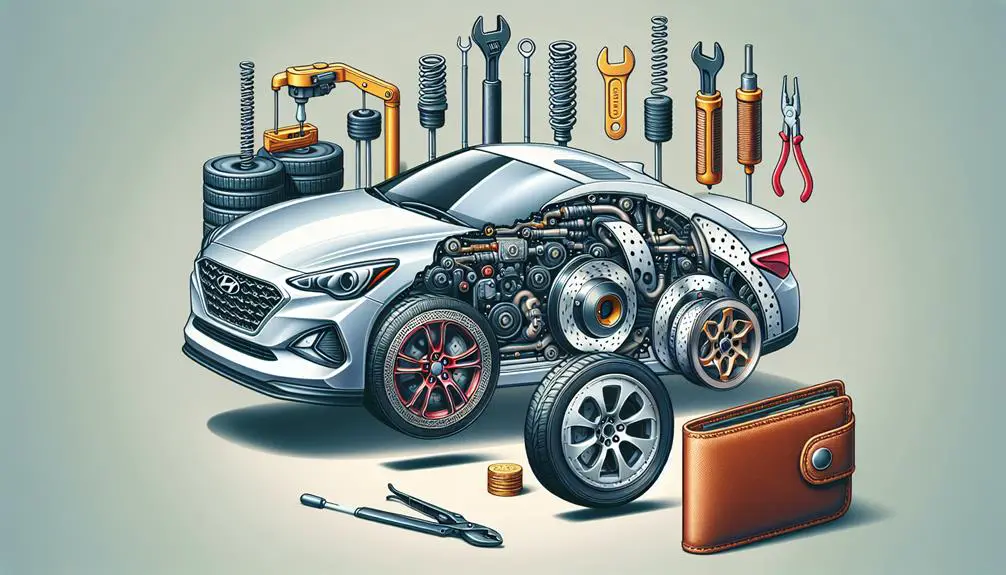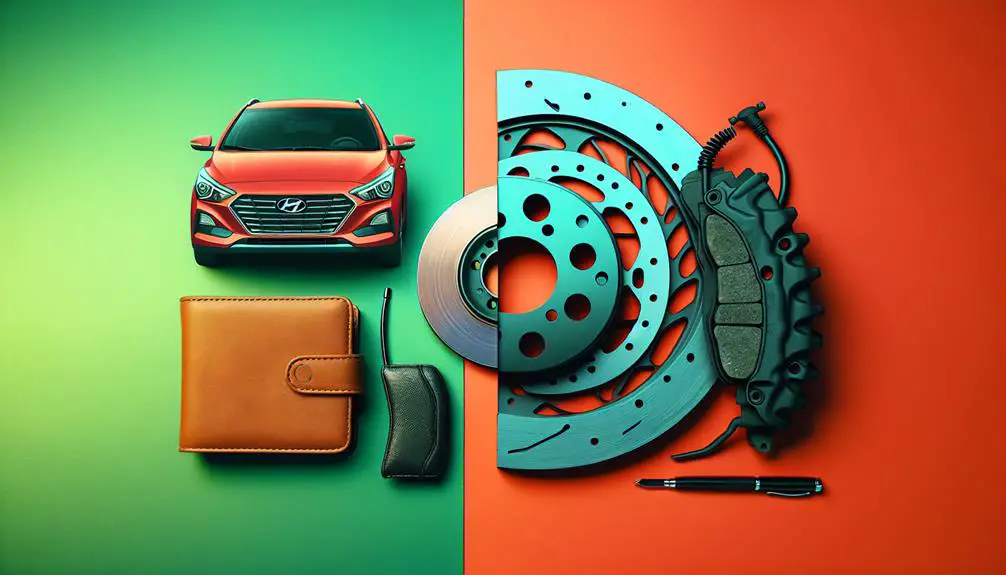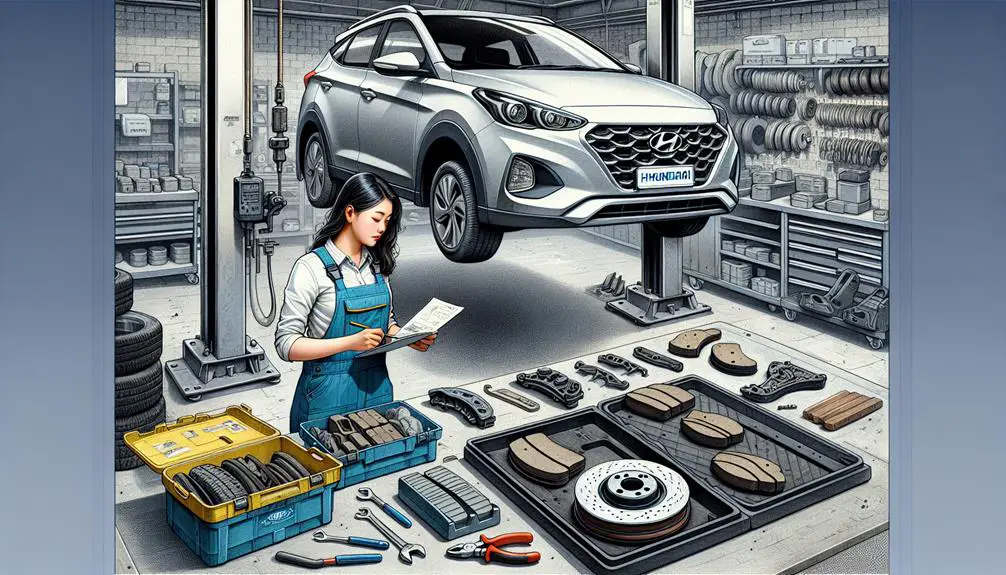The cost of Hyundai brake pads and discs varies widely depending on the model, material quality, and installation choice.
The price range for Hyundai brake pads can start from as low as $20 for budget options, going up to $200 for premium performance pads. Hyundai brake discs can range from $50 to $300 or more, depending on the material and design.
Installation costs for Hyundai brake pads and discs can also vary, with DIY options being cheaper but professional installation ensuring proper fitting. It is recommended to consult with a trusted mechanic or Hyundai dealership for accurate pricing and options.
Understanding the Basics

Before diving into the costs, it's essential to comprehend what brake pads and discs are and how they function in your Hyundai.
Brake pads and discs are vital components of your car's braking system. When you press the brake pedal, hydraulic fluid is pushed through the brake lines, activating the calipers that press the brake pads against the brake discs (or rotors). This friction slows down your car and eventually brings it to a stop.
Your Hyundai's brake pads are made from a composite material that wears down over time because of this friction. Generally, they're the primary component that'll need replacement in the braking system because they take the brunt of the wear. On the other hand, brake discs are sturdy metal plates that can last longer, but they too will wear down or get damaged and need replacing eventually.
It's also worth noting that brake pads and discs work together as a team. If one part is worn or malfunctioning, it can reduce the effectiveness of your brake system and potentially compromise your safety. That's why it's critical to regularly check both components for wear and tear or any signs of damage.
Comprehending the role and significance of brake pads and discs in your Hyundai not only helps you appreciate the costs involved in their maintenance or replacement but also highlights the significance of keeping them in good working condition for your safety on the road.
Factors Affecting Cost
Several factors can greatly influence the cost of replacing your Hyundai's brake pads and discs.
To start off, the model of your Hyundai plays a key role. Different models require specific types of brake pads and discs, which can vary considerably in price. For example, a high-performance Hyundai might need more expensive, high-grade materials compared to a standard model.
Then, there's the choice between OEM (Original Equipment Manufacturer) and aftermarket parts. OEM parts typically cost more but ensure a perfect fit and performance. Aftermarket options can be cheaper and offer a wider range of prices and qualities, but it's essential to choose reputable brands to avoid compromising on safety and durability.
Your choice of service location also affects the cost. Dealerships usually charge more for parts and labor compared to independent repair shops. However, the expertise and specialized equipment at a dealership might be worth the extra cost, especially for complex issues.
Labor costs can't be overlooked. They vary widely depending on your location and the complexity of the job. Some places have higher labor rates, and some brake jobs require more time and effort to complete, impacting the overall cost.
Lastly, any additional repairs or replacements that are found during the brake service can increase the cost. If your mechanic finds that the brake calipers or rotors need attention, this will add to your bill.
Comprehending these factors can help you make informed decisions when it's time to replace your Hyundai's brake pads and discs, ensuring you get the best value for your money.
Average Price Range

Understanding the factors that impact the cost, you're now better equipped to investigate the average price range for replacing Hyundai's brake pads and discs.
On average, you'll find that the cost for replacing brake pads on a Hyundai can range from $150 to $300 per axle, depending on the model and the type of brake pads you choose. It's vital to keep in mind that high-performance pads can push the price higher. For brake discs, the average cost per disc usually falls between $200 and $400, again varying based on the specific Hyundai model and the quality of the discs.
When you're getting both pads and discs replaced at the same time, you might see bundled pricing, which could slightly reduce the total cost. However, you're typically looking at an average total cost ranging from $350 to $700 for a complete service on both axles. This includes both parts and labor.
Bear in mind, labor costs can significantly impact the total price. They can vary widely depending on where you live and the service provider you choose. On average, labor can cost anywhere from $80 to $120 per hour, and the time needed to replace brake pads and discs can range from 1 to 2 hours. So, it's essential to factor in these costs when budgeting for the replacement.
Choosing the Right Parts
Selecting the right brake pads and discs for your Hyundai is important for ensuring top performance and safety. With the variety of options available, it's essential to understand what suits your driving habits and vehicle's needs. Whether you're driving through city traffic or cruising on the highway, the right parts can greatly impact your Hyundai's braking efficiency.
When choosing brake pads and discs, consider the material composition. Ceramic pads are known for their quiet operation and minimal dust, making them ideal for everyday driving. However, if you're after durability and performance, metallic pads might be your go-to, especially for more demanding conditions.
| Material | Best For | Price Range |
|---|---|---|
| Ceramic | Daily driving, low noise | $$ – $$$ |
| Metallic | High performance, durability | $$$ – $$$$ |
| Organic | Economy, light use | $ – $$ |
Additionally, don't overlook the compatibility and quality of the brake discs. A perfect match between the pads and discs ensures optimal performance and longevity. Opting for OEM (Original Equipment Manufacturer) parts guarantees compatibility, but there are high-quality aftermarket options that can offer comparable or superior performance.
What is the Cost of OEM Hyundai Brake Pads and Discs Compared to Aftermarket Options?
When it comes to oem brake pads worth, the cost of OEM Hyundai brake pads and discs can be higher compared to aftermarket options. However, OEM parts offer exact fit and quality assurance, whereas aftermarket options may vary in quality and performance. Consider your budget and car’s needs when making a decision.
Installation Considerations

Once you've chosen the right brake pads and discs for your Hyundai, it's critical to contemplate the installation process carefully. Whether you're considering tackling the job yourself or hiring a professional, comprehending what's involved is key to ensuring your brakes are installed correctly and function as they should.
If you're handy with tools and have some mechanical experience, you might be tempted to install the brake pads and discs yourself. It's a way to get to know your vehicle better and take pride in your DIY skills. However, it's crucial to assess your ability honestly. You'll need specific tools, such as a jack, lug wrench, and torque wrench, and a safe space to work. Make sure you follow a reliable guide or tutorial to avoid any mishaps. Remember, your safety and that of others on the road depend on the quality of this installation.
On the other hand, opting for a professional installation can save you time and possibly even money in the long run, considering the potential cost of correcting DIY mistakes. Professionals have the experience, tools, and knowledge to get the job done quickly and correctly. When selecting a service provider, don't just focus on the cost. Research their reputation, ask for recommendations, and make sure they're familiar with Hyundai vehicles.
Ultimately, the decision between DIY and professional installation boils down to your confidence in your mechanical skills, the complexity of the job, and your budget. Whichever route you choose, make sure it's the best fit for your situation.
Saving Money on Repairs
Finding ways to save on Hyundai brake pad and disc repairs can greatly reduce your vehicle's maintenance costs. It's not just about cutting corners; it's about being smart and strategic with your decisions.
Here are four practical strategies to help you save money without compromising on safety or quality:
- Compare Prices for Parts and Services: Don't just settle for the initial quote you get. Shop around and compare prices from different auto parts stores and service centers. Online retailers often offer competitive prices on brake pads and discs, but make sure you're buying genuine or high-quality aftermarket parts.
- Take Advantage of Promotions and Discounts: Keep an eye out for promotions, discounts, or coupons from auto repair shops and parts suppliers. Many businesses offer seasonal discounts or loyalty programs that can significantly reduce the cost of repairs and maintenance.
- Consider DIY for Simple Tasks: If you're handy with tools, consider doing simple maintenance tasks yourself. Replacing brake pads is a relatively straightforward process if you have the right tools and a good guide. However, make sure you understand what you're doing to avoid causing damage or compromising your safety.
- Regular Maintenance Checks: Preventative maintenance can save you a lot of money in the long run. Regular checks can help identify issues before they become major problems, reducing the need for expensive repairs. Always make sure your brake system is inspected during routine maintenance visits.
Conclusion
You've got all the details on Hyundai brake pads and discs now. Remember, the cost can vary widely, influenced by your car's model and the parts' quality.
Typically, you're looking at a range, but choosing wisely and considering installation seriously can save you money.
Don't forget, going for quality over the cheapest option often pays off in longevity and safety. Keep these tips in mind, and you'll navigate the repair process smartly, ensuring your Hyundai stays in top shape without emptying your wallet.